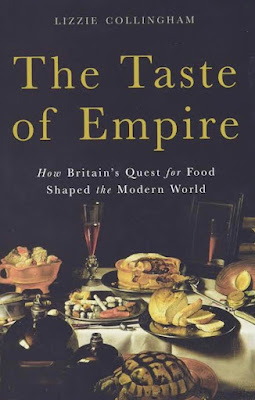The Taste of Empire-How Britain’s Quest for Food Shaped the Modern World by Lizzie Collingham - 2017 - 369 pages
This is one of the most interesting, informative and well written works of narrative nonfiction I have read in a good while.
The thesis, stated in the title is that the British Empire’s quest to feed the residents of England shaped much of the life of people all over the world, from North and South America, to the slave trade driven by the demand for sugar up through world war two where Collingham details the brutality of Churchhill in letting three million Indians starve rather than impose restrictions at home. Millions died or left Ireland because of the potato crop failing in mid 19th century, an event from which English landlords profited greatly and which their policies directly caused.
Each of the twenty chapters details a meal eaten by people from the Empire. We learn about their lives, some are based on real people, others on conjecture. The subjects range from West Indian slaves to very wealthy Englishmen ruling India. We see how what they ate shaped how they approached Life. We sit in on meals with slaves in the old south, with a middle class English family in 1930, we dine with a ship captain and leave a feast of a top official in The East India company feeling very bloated. Maybe we hope our family back home will accept our children with an Indian mistress. In some places English settlers came as family units, some as single men. Local women were seen as appropriate surrogates, willing or just desperate to feed their own families by submitting to colonial invaders. This in the long term produced the mixture of populations over much of the world.
Collingham devotes a lot of Space to English settlers in Newfoundland in the late 1600s. They began a pre-industrial processing of dried fish from their catches that were sold to West Indian sugar plantation owners to feed their slaves. We see how the English working class became hooked on tea from India served with a great deal of sugar. The tea and sugar gave the workers energy to spend in factories. As their income increased the English traditions of meat and potatoes and a Sunday roast dinner developed. So on the backs of sugar from slaves England developed a fleet to control world trade. The Barbados was for a period home to hugely rich plantation owners who imported all the luxury foods of home.
In pre-independent America, settlers ate better per Collingham than people anywhere else. At the time of the Revolution American soldiers were 3.5 inches taller than their English counterparts.
Collingham explains how beef from Argentina became very important in England. I learned a good bit about the development of canning of meat. Resulting in the famous English tins still in expensive gift baskets.
There is so much to learn from this book. Most historians do not go into details about food and trade in food.
This book is available now as a Kindle for $3.95
Lizzie Collingham is an associate fellow at the University of Warwick. The author of three books, including The Taste of War and Curry, Collingham lives in Cambridge, United Kingdom.
Many biographies make no mention of what their subjects food preferences were.
I give this book my total endorsement.
Mel u
The Reading Life





No comments:
Post a Comment